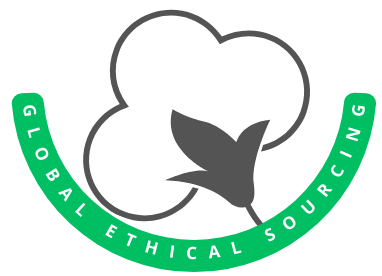Regenerative Cotton Farming
Promoting ethical and sustainable manufacturing practices is crucial for businesses and industries worldwide. Here's a guide on what ethical and sustainable manufacturing entails and why it's essential:
Key aspects of our ethical manufacturing include:
1. Fair Labor Practices:
- Ensuring fair wages, safe working conditions, and reasonable working hours for employees.
- Prohibiting child labor and forced labor.
- Providing opportunities for worker empowerment and collective bargaining.
2. Worker Health and Safety:
- Implementing safety measures to protect workers from accidents and occupational hazards.
- Regularly auditing and improving workplace safety.
3. Respect for Human Rights:
- Upholding human rights principles, such as non-discrimination, freedom of association, and protection against harassment and discrimination.
4. Transparency and Traceability:
- Maintaining transparency in the supply chain to trace the origin of products and materials.
- Disclosing information about sourcing and production practices to consumers.
5. Community Engagement:
- Engaging with local communities where manufacturing facilities are located to promote positive social impact.
- Supporting community development initiatives.
Sustainable Manufacturing:
Sustainable manufacturing focuses on reducing the environmental impact of the production process while maintaining economic viability. Key aspects of sustainable manufacturing include:
1. Resource Efficiency:
- Minimizing waste and optimizing the use of resources, such as water, energy, and raw materials.
- Implementing recycling and reuse practices.
2. Reducing Emissions:
- Implementing technologies and processes to reduce greenhouse gas emissions.
- Transitioning to renewable energy sources.
3. Minimizing Pollution:
- Employing clean and eco-friendly production methods to reduce air and water pollution.
- Managing hazardous waste responsibly.
4. Circular Economy:
- Promoting product design that facilitates repair, reuse, and recycling.
- Encouraging the adoption of circular business models.
5. Life Cycle Assessment (LCA):
- Conducting LCAs to evaluate the environmental impact of a product throughout its entire life cycle, from raw material extraction to disposal.
6. Certifications and Standards:
- Adhering to recognized sustainability standards and certifications, such as ISO 14001 (Environmental Management) and Cradle to Cradle.
Why Ethical and Sustainable Manufacturing Matters:
1. Environmental Impact:
Ethical and sustainable manufacturing helps reduce the environmental footprint, conserving natural resources and reducing pollution.
2. Social Responsibility:
It promotes fair treatment of workers and supports local communities, contributing to social well-being.
3. Consumer Demand:
An increasing number of consumers prefer products made ethically and sustainably, leading to market demand.
4. Legal and Reputation Risks:
Companies that fail to adhere to ethical and sustainable practices can face legal consequences and damage to their reputation.
5. Long-Term Viability:
Sustainable manufacturing practices help businesses adapt to changing regulations and consumer expectations, ensuring long-term viability.
Incorporating ethical and sustainable manufacturing practices into your business not only aligns with social and environmental responsibility but also can be a competitive advantage in a market where consumers and stakeholders increasingly value ethical and sustainable products and production processes.
